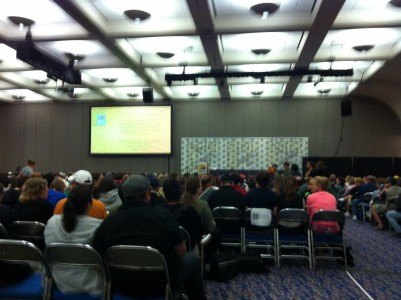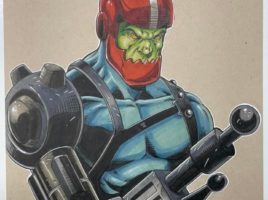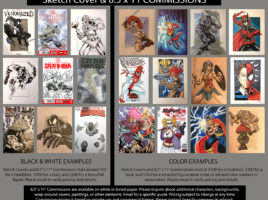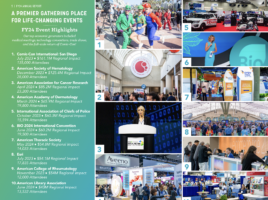 One of the most important traditions at San Diego Comic Con is the The Comics Arts Conference, held in conjunction with SDCC every year. The Comics Arts Conference is where scholars, professionals, critics, industry professionals and historians who study comics hold panels and discussions on the importance and meaning of comics in today’s culture.
One of the most important traditions at San Diego Comic Con is the The Comics Arts Conference, held in conjunction with SDCC every year. The Comics Arts Conference is where scholars, professionals, critics, industry professionals and historians who study comics hold panels and discussions on the importance and meaning of comics in today’s culture.
We’re excited to announce that we have their full schedule lineup of sixteen panels this year – taking place in Room 26AB over the four days – and it’s full of great programming like Legends of the Knight, a documentary about Batman’s lasting impact that will premiere segments from the documentary, and Geek Therapy: How Superheroes Empower All of Us, where panelists will dissect the psychology of superheroes.
Take a look at the full Comics Arts Conference schedule below:
THURSDAY
10:30-12:00 Comics Arts Conference Session #1: Comics and the Violent Past—Ghenwa Hayek (Claremont McKenna College) examines how graphic fiction has flourished in Lebanon as a post-war generation copes with the burden of memories and a younger generation thirsts to know more. Andrew J. Friedenthal (University of Texas at Austin) compares Justice Society of America comics in the Golden Age with the 1980s’ retconned account of their World War II adventures to show how escapist literature helps us deal with history as it happens and after. Sam Cannon (University of Texas at Austin) investigates how Fábio Moon and Gabriel Bá’s graphic novel Daytripper calls into question racial and national identities as well as the possibility of survival in contemporary Brazil. Room 26AB
12:00-1:00 Comics Arts Conference Session #2: Geek Therapy: How Superheroes Empower All of Us—Psychologist Patrick O’Connor (The Chicago School of Professional Psychology; Comicspedia) and Licensed Psychotherapist Josué Cardona (Geek Therapy Podcast) discuss geek culture, the psychology of superheroes, and the therapeutic value of comics. Laura Vecchiolla and Elizabeth Smith (The Chicago School of Professional Psychology) and Licensed Psychologists Frank Gaskill and Dave Verhaagen (Southeast Psych) join them to provide the ultimate expertise on the healing power of superheroes. Travis Langley (Batman and Psychology: A Dark and Stormy Knight) moderates. Room 26AB
1:00-2:00 Comics Arts Conference Session #3: Crossover Series: Comics to College Writing—Writing instructors Rich Shivener (Northern Kentucky University), John Silvestro (Miami University), and Alex Jenkin (Miami University) discuss how they incorporate Batman, Scott McCloud, Will Eisner, and select indie comics into freshman-level college courses with diverse audiences, even those who are not fans of comics, considering both comics and academic writing as different methods to express arguments, narratives, and ideas. They reveal how students can use academic writing to analyze, realize, and understand comics, and comics to think about the limitations of academic writing and what it can and cannot show. Room 26AB
2:00-3:30 Comics Arts Conference Session #4: Teaching Comics—Aaron Kashtan (Georgia Institute of Technology) discusses why and how instructors can use comics to make students more aware of the materiality of media, both when analyzing media artifacts and when producing media artifacts of their own. Jeremy Johnson (University of Minnesota) describes empirical research on how teachers taught middle school students about the Holocaust by using comics creation to share a non-fiction, research-based story. Peter Carlson (Green Dot Public Schools, UCLA) and Antero Garcia (Colorado State University) share the findings from their own research on how comic books can serve as tools to foster dialogue and nurture relationships that empower students. Room 26AB
FRIDAY
10:30-11:30 Comics Arts Conference Session #5: Legends of the Knight: Batman and the Inspirational Power of Heroic Stories—The most important Batman tales are not in comic books, TV shows, or Hollywood movies. They are within the people for whom the Dark Knight has become a symbol. Brett Culp will premiere segments from his documentary film Legends of the Knight and speak with Travis Langley (Batman and Psychology: A Dark and Stormy Knight), Vasilis Pozios (Broadcast Thought), Patrick O’Connor (Comicspedia), and Alan Kistler (Comic Book Resources) about how the modern myth of Batman inspires real people in areas of creativity, education, and overcoming adversity. Room 26AB
11:30-1:00 Comics Arts Conference Session #6: Masculinities/Femininities—Sheila Malone (University of California, Los Angeles) investigates how Batwoman and Batgirl displace the male hero in order to fight crime and live out narratives that befit a superhero/ine in a contemporary non-hetero world where queer, disabled and renegade motorcycling are super/powerful. Jaclyn Hymes (California State University Northridge) expands Sedgwick’s theories of homosociality by applying them to Maggie and Hopey’s fluid sexualities in Jamie Hernandez’s “Locas” stories. Using the lens of queer theory, Eric Schlegel explores how Wonder Woman, Superman, and Batman’s distinct experiences of identity can help LGBTQ individuals, and then in turn society as a whole, understand our own identities. Room 26AB
1:00-2:00 Comics Arts Conference Session #7: Heroes/Creators: The Comic Art Creations of Civil Rights Legends—Civil rights leaders have long used the communicative power of the combined image and word to discuss voter registration, non-violent resistance, and human rights. Inspired by the graphic novel trilogy March, co-written by Congressman John Lewis and Andrew Aydin and illustrated by Nate Powell, Joseph R. Givens (Louisiana State University), Andrew Aydin (March: Book One; Georgetown University), Stanford Carpenter (Institute for Comics Studies), Damian Duffy (University of Illinois at Urbana-Champaign), and John Jennings (University at Buffalo) will discuss the rich history of creative collaboration between civil rights leaders and comic creators. Room 26AB
2:00-3:30 Comics Arts Conference Session #8: Comics Theory—Scott Daniel Boras (Winona State University) examines the sensory experience of reading comics, what it means to be a collector, and other aspects of materiality that might be lost or left behind when comic books go digital. Neil Cohn (University of California, San Diego) will summarize what the latest research from cognitive neuroscience tells us about what happens in your brain when you read comics. Kay K. Clopton (Ohio State University) analyzes how speech, sound, and emotive effects feed into the experience of reading American and Japanese women’s comics. Room 26AB
SATURDAY
10:30-12:00 Comics Arts Conference Session #9: What Is A Superhero? Professional and Scholarly Views—Contributors to What is a Superhero (Oxford University Press, 2013) explore the definition of the superhero and the role of the supervillain in the genre from a range of disciplinary, scholarly, and professional perspectives. Co-editors Robin Rosenberg (Huffington Post) and Peter Coogan (Washington University in St. Louis), are joined by contributors John Jennings (University at Buffalo), Stanford Carpenter (Institute for Comics Studies), Dana Anderson (Maine Maritime Academy), Paul Levitz (Legion of Super-Heroes), and Fred Van Lente (Brain Boy). Room 26AB
12:00-1:30 Comics Arts Conference Session #10: Japan and Global Influence—Dexter L. Thomas, Jr. traces the effect that Yutsoko Chusonji’s work had on the hip-hop scene in Japan, both as an “edutainment” writer and as the woman who personally bankrolled Japan’s first ever hip-hop radio show. June M. Madeley (University of New Brunswick, Saint John) investigates the readership, viewing, and meaning-making practices of manga readers and anime viewers outside Japan, in particular in English translation. Jonathan Valdez (San Diego State University) examines activism from the Asian American community by focusing on comics in Secret Identities: The Asian American Superheroes Anthology and Shattered: The Asian American Comics Anthology, arguing that these anthologies seek to dethrone longstanding Orientalist stereotypes. Room 26AB
1:30-3:30 Comics Arts Conference Session #11: The Poster Session—The CAC’s poster session gives attendees the opportunity to interact directly with presenters. Come talk one-on-one with these scholars about their projects!
Comic-Con Group
In collaboration with the founders of San Diego Comic-Con International, the San Diego State University Library’s Comic Arts Committee is helping to preserve and promote San Diego’s rich comics, science fiction, and popular arts culture. Markel D. Tumlin, Anna Culbertson, Pamela Jackson, Michael Lapins, and Wil Weston (San Diego State University) will present on the committee’s current projects and activities and SDSU’s commitment to collecting and preserving the cultural heritage of Comic-Con, highlighting the Comic-Con Kids grant project and the recent acquisition of Comic-Con co-founder Richard Alf’s personal papers.
Revolutionary Comics Group
Jacob Holt (Henderson State University) examines X-Men’s Magneto as a Darwinist and a Civil Rights leader. Mark A. Havstad (Havstad Water and Energy Company) identifies the key traits lacking in extant heroes and heroines that make them scientifically and globally incapable of dealing with challenges like global climate change, religious and fundamentalist worldviews, and widespread poverty.
Teaching with Comics Group
Nicole Rehnberg (California State University, Fullerton) argues that fairy tale comics can assist students in learning how narratives work by decoding new retellings of familiar stories. Barbara Glaeser (California State University, Fullerton) offers several strategies for using comics to engage reluctant readers and writers and low-achieving students that can be used both in the classroom and at home. Michael Kersulov (Indiana University) discusses his findings on how autobiographical graphic novels and other pictorial memoirs can be and have been used in secondary schools as a way to promote traditional and visual literacy.
Postmodern Comics Group
Kyle Eveleth (University of Kentucky) examines the ways in which the structural elements of Watchmen’s narrative both strengthen and subvert its content to upset “normal” (mimetic) conceptions of time. Paul Cheng (University of California, Riverside) focuses on how Chris Ware’s work manipulates the formal techniques of comics to create a “meta-comic” that both celebrates and satirizes the medium, in addition to his often devastating critiques of social life. Joyce C. Havstad (University of California, San Diego) compares panels from Asterios Polyp with pages from several iconic works of postmodernist literature, showing how Mazzucchelli employs techniques more commonly associated with written novels, while adapting these techniques to suit the medium of graphic novels, with implications for both media at large.
Comics off the Page Group
Lesley Farmer (California State University Long Beach) explores how to teach pre-service librarians and education technologists the concepts of information architecture through the use of comic arts. Mara Wood and Allen Thomas (University of Central Arkansas) present the results of their study on how well readers’ abilities to connect to and become part of the stories they read are predicted by their frequency of comic book reading. Eric Bruce (Western Oregon University) applies Dynamic Systems Theory, which proposes that decision-making is shaped by the interaction of individual, task, and environment, to the world of Batman, considering how the unique characteristics of Batman’s character and environment shape his plan of action.
Comics and Transformation Group
Julie Humphrey (University of California, Santa Barbara) critiques how geek fashion has become a marker of sex appeal and intelligence through popular culture and gender studies. Benjamin J. Villarreal (Columbia University) examines Lee Bermejo’s Batman: Noel as a retelling of Dickens’ A Christmas Carol, asking if Bermejo’s adaptation qualifies as part of a lost 19th century literary genre because of its source material.
Comics and Psychology Group
Brian Lott (Henderson State University) looks into the psychological aspects of the Black Widow, asking what cognitive processes are involved in her behavior and how well these fictional representations reflect real life manifestations. Benjamin Graves (Henderson State University) uses Alfred Adler’s theories of individual psychology to examine the links between Ant-Man’s size manipulation and his inferiority issues. Tiffany Pitcock (Henderson State University) determines if the “birth” order of the Robins affects their characterizations and relationships with Batman and with one another as pseudo-siblings. Halee Smith (Henderson State University) asks if Bruce Banner’s refusal to accept his alter-ego the Hulk as an angry facet of himself is a Freudian defense mechanism or a case of Dissociative Identity Disorder. Samantha Hunter (Henderson State University) investigates if the X-Men’s Jean Grey qualifies for Post-Traumatic Stress Disorder, how the repression of her memories affects her ability to cope, how her childhood resulted in her choice to join the X-Men, and how Xavier has helped her mental stability over the years. Room 26AB
SUNDAY
10:30-11:30 Comics Arts Conference Session #12: Superman on Trial: The Secret History of the Siegel and Shuster Lawsuits—Five years after the Siegel heirs won a historic victory and regained a share of the Superman copyright, a higher court has set aside the verdict and also shut down the Shuster estate’s claim. As we face the final chapter of the Superman copyright dispute, this panel will explain what is really happening. What crucial details were overlooked or misinterpreted? Is there still hope for other creators? Or does Superman’s 75th anniversary mark the end of truth, justice and the American dream? Moderated by The Beat’s Heidi MacDonald with commentary by Siegel and Shuster biographer Brad Ricca (Case Western Reserve University), this panel features the legal analysis of Jeff Trexler (Fordham Law School), whose influential commentary on the Superman lawsuits set a new standard for comics-related legal analysis and also became part of the case. Room 26AB
11:30-1:00 Comics Arts Conference Session #13: What Are We Seeing Here? Negotiating Religious Presence and Purpose in Comics, Comix, & Webcomics—This panel examines the intersection of religion and comics in two ways: the presentation of religion in comics and comics’ influence on religion and society. Toby Braden Johnson (University of California, Riverside) discusses depictions of Islam in Teenage Mutant Ninja Turtles Adventures, considering both the comics’ creators and the analysis of the comics themselves and bringing to light comics’ role as a source of social and religious commentary. Sean Sagan (University of California, Riverside) analyzes the True Komix religious tracts published by new religious movement Family International during the 1970’s-80’s and asks how this group’s sexualized theologies manifest in comic exegesis. Cori Knight (University of California, Riverside) considers acts of creation present in the webcomic Girl Genius. Set in a scientific world, the way the comic’s characters create freely or undertake acts of self-creation merits investigation. Room 26AB
1:00-2:30 Comics Arts Conference Session #14: Comics and the Punk Aesthetic—Comics have long had a connection with subculture. In the punk movement, comics found an aesthetic which could help preach a message to the counter-culture. This panel examines how both mainstream and underground comics have borrowed and used the punk aesthetic for their own means. Christopher B. Field (Southern Illinois University-Carbondale) discusses OMAC by Jack Kirby and how the under-appreciated work uses the punk aesthetic. Michael MacBride (Minnesota State University) examines how punk music and Justin Green’s Binky Brown react differently to male sexuality. Christopher Douglas (Southern Illinois University) compares the aesthetic of the Japanese cyber-punk manga AKIRA to the bosozoku motorcycle gangs of the 1980s. Keegan Lannon (Aberystwyth University) discusses Grant Morrison’s The Invisibles as a punk manifesto. Room 26AB
2:30-3:30 Comics Arts Conference Session #15: The Culture of Comic-Con: Field Studies of Fans and Marketing—Comic-Con offers students of popular culture an amazing venue to study how culture is marketed to and practiced by its fans. Alissa Butler (University of Massachusetts-Boston), Krystal Dean (Wittenberg University), Charity Fowler (Virginia Commonwealth University), Regina Gasser (Wittenberg University), Kenneth J. Garrett (Lynchburg College), Kenley Hoover (Lynchburg College), Nathan Knoebber (Wittenberg University), Sarah Lavinder (Lynchburg College), Lauren Levitt (New York University Steinhardt), and Jessica Stephenson (University of Nebraska-Lincoln) present initial findings from a week-long ethnographic field study of the intersection of fan practice at the nexus of cultural marketing and fan culture that is Comic-Con 2013. Matthew J. Smith (Wittenberg University) moderates. Room 26AB



